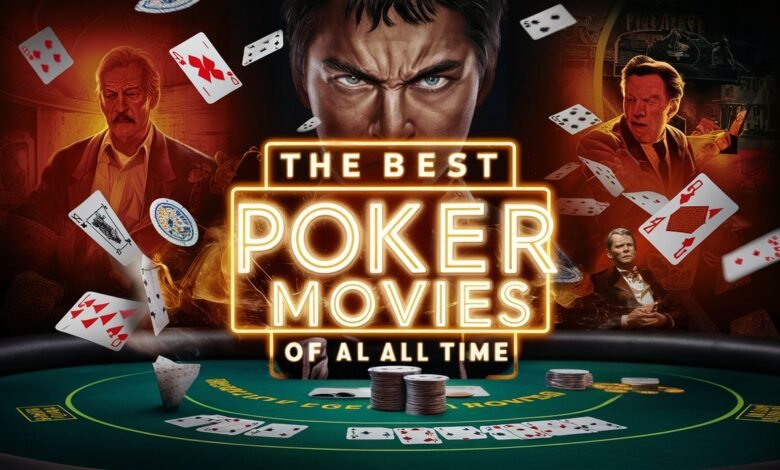The Best Poker Movies of All Time: A Cinematic Guide to High-Stakes Drama

Introduction
Poker has long been a symbol of risk, strategy, and human psychology—elements that translate seamlessly to the silver screen. The best poker movies blend tension, character development, and the thrill of the game to create unforgettable narratives. From gritty underground games to glamorous casino showdowns, these films explore themes of ambition, deception, and redemption. Whether you’re a poker enthusiast or a casual viewer, this guide dives into the most iconic poker movies, breaking down their storytelling brilliance, cultural impact, and why they resonate with audiences. Let’s shuffle the deck and explore the films that have dealt their way into cinematic history.
1. The Classics That Defined the Poker Genre
The foundation of poker cinema lies in timeless classics that set the standard for storytelling in the genre. The Cincinnati Kid (1965), starring Steve McQueen, is a quintessential example. This film pits the titular “Kid” against a seasoned pro, Lancey Howard (Edward G. Robinson), in a high-stakes poker duel. The movie’s strength lies in its slow-burn tension and exploration of ego versus experience, culminating in one of cinema’s most iconic poker showdowns. Similarly, California Split (1974), directed by Robert Altman, offers a raw, unfiltered look at the lives of two gamblers chasing wins and escaping losses. Its improvisational style and focus on addiction rather than glory provide a gritty counterpoint to Hollywood’s romanticized gambling narratives. These classics established poker as a metaphor for life’s unpredictability, blending character-driven drama with the game’s inherent suspense.
2. Modern Masterpieces: Poker in the 21st Century
The 21st century brought a fresh wave of poker films that resonated with both critics and audiences. Rounders (1998), starring Matt Damon and Edward Norton, is often hailed as the definitive modern poker movie. Its portrayal of underground poker circuits and the psychological warfare between players elevated the genre. Damon’s character, Mike McDermott, embodies the struggle between ambition and morality, while John Malkovich’s eccentric Russian mobster, Teddy KGB, delivers a villain for the ages. Another standout is Molly’s Game (2017), based on the true story of Molly Bloom. Jessica Chastain’s riveting performance explores the intersection of power, celebrity, and legality in high-stakes poker games involving Hollywood elites and Wall Street tycoons. These films modernized poker storytelling by emphasizing realism, moral complexity, and the game’s evolving cultural relevance.
3. Biographical Films: Real-Life Poker Legends on Screen
Some of the most compelling poker movies are rooted in reality, dramatizing the lives of legendary players. Maverick (1994), starring Mel Gibson, combines humor and adventure in a fictionalized take on the Old West gambler Bret Maverick. Though lighter in tone, the film pays homage to poker’s role in American folklore. On the biographical front, The Grand (2007) offers a mockumentary-style look at eccentric players competing in a Las Vegas tournament, blending satire with genuine poker strategy. However, the most poignant real-life portrayal comes from documentaries like All In: The Poker Movie (2012), which chronicles the 2000s poker boom and its cultural ripple effects. These films humanize the game, showcasing the triumphs and tragedies of those who’ve dedicated their lives to mastering it.
4. Hidden Gems: Underrated Poker Films Worth Watching
Beyond mainstream hits, several underrated films deserve recognition for their unique takes on poker. A Big Hand for the Little Lady (1966) subverts expectations with a Western-themed tale of a family embroiled in a high-stakes game, blending suspense and dark humor. Similarly, The Cooler (2003) uses poker as a backdrop to explore themes of luck and redemption, with William H. Macy delivering a haunting performance as a man whose mere presence “cools” winning streaks. For a darker twist, Croupier (1998) delves into the psyche of a casino employee entangled in a dangerous poker scam. These hidden gems prove that poker’s narrative potential extends far beyond traditional tropes, offering fresh perspectives on risk and human behavior.
5. The Art of Bluffing: How Poker Movies Capture Psychological Warfare
At their core, poker movies thrive on the art of bluffing—a metaphor for the duplicity and mind games inherent in human interactions. Films like Casino Royale (2006) exemplify this, with Daniel Craig’s James Bond facing off against a terrorist financier in a tense Texas Hold’em game. The scene isn’t just about cards; it’s a battle of wits, where every gesture and bet reveals hidden motives. Similarly, The Sting (1973) uses poker as part of a larger con, emphasizing deception as a survival tool. These movies elevate poker from a game of chance to a cerebral duel, mirroring the complexities of trust and betrayal in real life.
Conclusion: Why Poker Movies Continue to Captivate Audiences
Poker movies endure because they mirror the highs and lows of the human condition. The thrill of a winning hand, the agony of a bad beat, and the quiet intensity of a well-executed bluff resonate universally. Whether through biographical dramas, gritty indie films, or blockbuster spectacles, these stories remind us that poker isn’t just a game—it’s a lens through which we examine ambition, resilience, and the cost of chasing victory. As long as audiences crave stories about risk and reward, poker will remain a winning hand in cinema.
Frequently Asked Questions (FAQs)
Q1: What makes a great poker movie?
A great poker movie balances authentic gameplay with compelling characters and high emotional stakes. It uses poker as a narrative device to explore themes like greed, redemption, or psychological conflict.
Q2: Are poker scenes in movies realistic?
While some films prioritize drama over accuracy (e.g., exaggerated hands), others, like Rounders or Molly’s Game, consult poker experts to ensure realistic gameplay and terminology.
Q3: Which poker movie is best for beginners?
Rounders is ideal—it explains strategy without oversimplifying, making it accessible yet engaging for newcomers.
Q4: Do any poker movies focus on female players?
Yes! Molly’s Game centers on a female protagonist, while Lucky You (2007) features Drew Barrymore in a supporting role exploring the game’s emotional toll.
Q5: What’s the most underrated poker film?
The Cincinnati Kid is often overshadowed by The Sting or Rounders but remains a masterclass in slow-burn tension and character study.
Q6: Are there comedy poker movies?
Absolutely! Maverick and The Grand infuse humor into the genre, offering lighter takes on poker’s eccentric personalities.
Let these films deal you into a world where every hand could change a life—and every bluff could be your last. 🃢



